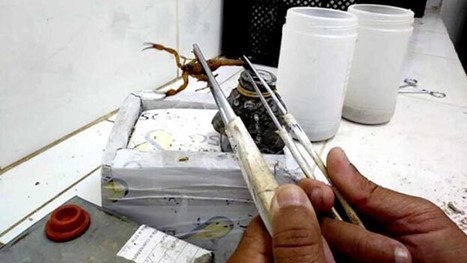
HAVANA TIMES – Gema, a 65-year-old from Havana, received the news in 2013 that she had liver cancer at a fairly advanced stage. In a rapid physical decline, she clung to the recommendation made by a neighbor to look for blue scorpion venom, because the product could “stop the advance of cancer.” In a tiny jar accompanied by a dropper, the woman obtained a few millimeters of a liquid that she had to mix with plenty of water and consume every day. When the amount of venom in the bottle decreased, she made new contacts to buy the “miracle formula.”
Without a label, expiration date and sold in the informal market, the veracity and effectiveness of the product was based on trust. “The person who sells it to me gets it from a laboratory, where they discovered its properties,” she said one day to friends who were curious about the venom. Hundreds of pesos later and after many glasses of diluted drops, she died. She still had two jars of scorpion venom left that her nephew sold to another interested patient. A couple of small, amber-colored jars, unlabeled, surrounded by promises of improvement and recovery.
Patients from all over the world have come to Cuba as a lifeline since, in 2011, the state-owned Labiofam introduced Vidatox, a drug whose active ingredient was the venom of the Cuban blue scorpion (Rhopalurus junceus), to which it attributed “proven anti-tumor, analgesic and anti-inflammatory efficacy.” The researcher in charge of explaining the product – and its master mind – was the young microbiologist Alexis Díaz, who then reported that there were already customers eager to try it in Spain, Italy, Albania and several Latin American countries.

Vidatox was not the hen with the golden egg that Havana was hoping for, although hundreds of patients bought it, and many paid for months of treatments in Cuba. Soon, international oncologists began to warn cancer patients about the scam. In a few years, the drug was so discredited worldwide that some clients and relatives of deceased patients ended up calling it “Cuban water.” To keep a low profile, Labiofam then began to qualify Vidatox as a homeopathic product (a pseudotherapy based on water and alcohol solutions).
In an unprecedented acrobatic maneuver in Cuban Public Health, the creative team of Vidatox – including Díaz – shut down Labiofam and formed a new international research group, Lifescozul, which claimed to sell “the most advanced formulation of the blue scorpion venom” – Escozul – while harshly criticizing Vidatox.
Vidatox, they insist, is manufactured by Labiofam, a company that specializes in “products for veterinary use,” and does not contain “a single molecule of the blue scorpion venom.” But the criticism doesn’t stop there, Díaz’s team warns. Vidatox not only does not cure anyone but also “causes and accelerates metastases due to the high degree of alcohol it contains.”
On the contrary, they argue, the Escozul brand – “created by Cuban scientists” supervised by Díaz – is available in more than 30 countries, although “it is in the Health Registration phase” for commercialization. The company’s website


